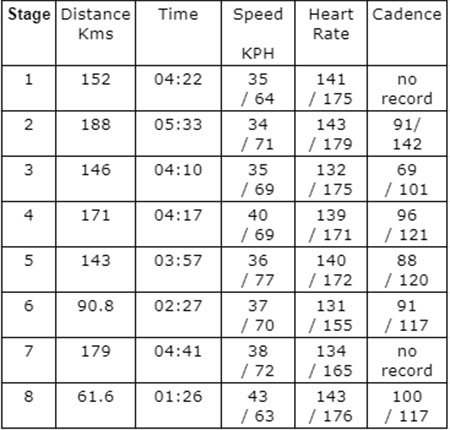I attended a lecture in May by Prof Anders Ericsson in UCD. The lecture was organised by the UCD School of psychology and was titled 'The Making of Experts by Deliberate Practice and why Innate Talent does not seem to Matter'
The information notes from the UCD advertisement for the presentation included below explains Prof. Ericssons background and some of the work that he has completed in regard to expert performances. I have underlined some relevant areas of the notes.
K. Anders Ericsson, PhD, is presently Conradi Eminent Scholar and Professor of Psychology at Florida State University. After his Ph. D. in Sweden, he collaborated with the Nobel Prize winner in Economics, Herbert A. Simon on verbal reports of thinking
leading to their classic book Protocol Analysis: Verbal Reports as Data (1984). Currently he studies the measurement of expert performance in domains, such as music, chess, nursing, law enforcement, and sports, and how expert performers attain their superior performance by acquiring complex cognitive mechanisms and physiological adaptations through extended deliberate practice. He has edited several books on expertise, the influential Cambridge Handbook of Expertise and Expert Performance consisted of over 40 chapters and 900 pages and the recent Development of Professional Expertise: Toward measurement of expert performance and design of optimal learning environments, which appeared this summer. He has published articles in prestigious journals, such as Science, Psychological Review, and Trends of Cognitive Science. In 2007 he wrote the article the Making of an Expert for Harvard Business Review.
THE 10,000 HOURS OR TEN YEARS RULE.
According to research by Prof Ericsson and others expert performances are achieved according to the number of hours of
deliberate practise, for example there are on-going studies on expert performance that is demonstrating that while talent is one part of excellent performances a common denominator of successful athletes seems to be the amount of hours and years spent on deliberate practise.
DEFINITIONS OF DELIBERATE PRACTISE:
When a person engages in a practise activity(typically designed by teachers) with the primary goal of improving some aspect of performance. P 67 expert performance in sports Janet. L Starkes , K.Anders Ericsson
that is deliberate practice (Ericsson, Krampe & Tesch-Romer, 1993)--activities designed, typically by a teacher, for the sole purpose of effectively improving specific aspects of an individual's performance. For example, the critical difference between expert musicians differing in the level of attained solo performance concerned the amounts of time they had spent in solitary practice during their music development, which totaled around 10,000 hours by age 20 for the best experts, around 5,000
hours for the least accomplished expert musicians and only 2,000 hours for serious amateur pianists. More generally, the accumulated amount of deliberate practice is closely related to the attained level of performance of many types of experts, such as musicians (Ericsson et al., 1993; Sloboda, et al., 1996), chessplayers (Charness, Krampe & Mayr, 1996) and athletes (Starkes et al., 1996).
10,000 HOUR RULE, if we look at these figures then look at our Irish cyclists in the different categories will we find that A4 trains on average X amountof hours per week whereas Elites and Professionals train x+ amount.
DELIBERATE PRACTISE
Then we must look at the type of training that Irish cyclist's do, is it deliberate practise as defined by Prof. Ericsson? Here is a good example of information that could be used a guide as to how to train for the An Post Ras using the deliberate practise theory.,
The following table is from one of Colm's Polar Ras diaries and gives a breakdown of time/distance speed -cadences - heart Rates- for each stage. You can see from the Table that in this case training for the An Post Ras should include many variables in the training sessions.

|
MOTIVATION
for example how are some people motivated to work so hard and we all know the riders who people say of He/ She could have been great they had great talent/class etc etc but they ultimately didn't fulfil the talent..
So why was it that he or she did not achieve their full potential, in some cases it's a case of the sport might not have been their top priority for one reason or another. they may have been motivated to study or work harder than train for cycling. Or they might not want to lead a disciplined life that cycling demands and might sooner spend their time socialising.
So as most of us know from practical experience physical talent will only take an athlete so far. The ones that get to the top and stay there for extended periods of time usually work harder at it and dedicate most of their life to the sport.
If it was all about talent why would the top professionals consistently train so hard? No one wins Tour De Frances without many years of cycling experience and thousands of racing and training kilometres.
TALENT
ID So does this raise questions about talent identification systems? Instead of or as well as looking at the physical talent maybe some of the other qualities should be considered.
MOTIVATION
Does the top athletes just have a stronger motivation to be successful and give full focus and dedication to their sport. Should assessment of motivation and work ethic play a bigger part in Talent ID?
WORK ETHIC
To be successful a strong work ethic is obviously required as well. If we look at the greatest Irish cyclists Kelly and Roche they both had a strong work ethic. Stephen Roche worked delivering milk with his father in the very early mornings and in all weathers. Sean Kelly worked on the farm, also like Roche this entailed early mornings, hard work and in all weathers.
How can this information be used to improve your performances?
Safely
Increase the number of hours that you do appropriate to current age and experience, improve the specifics of your training. Break down whatever discipline you do and train accordingly.
I can hear some of you say, but I only have so many hours to train!
Do a time audit, how many hours do you spend doing different non-essential activities that do not add to your ability as a cyclist. Are you willing to sacrifice some of them, so that you can include more training or rest?
There's a quote from someone thought to be the the greatest champion ever below, with his view on work and the also views of a great coach.
"The fight is won or lost far away from witnesses - behind the lines, in the gym and out there on the road, long before I dance under those lights."
- Muhammad Ali
The price of success is hard work, dedication to the job at hand, and the determination that whether we win or lose, we have applied the best of ourselves to the task at hand.
-Vince Lombardi





